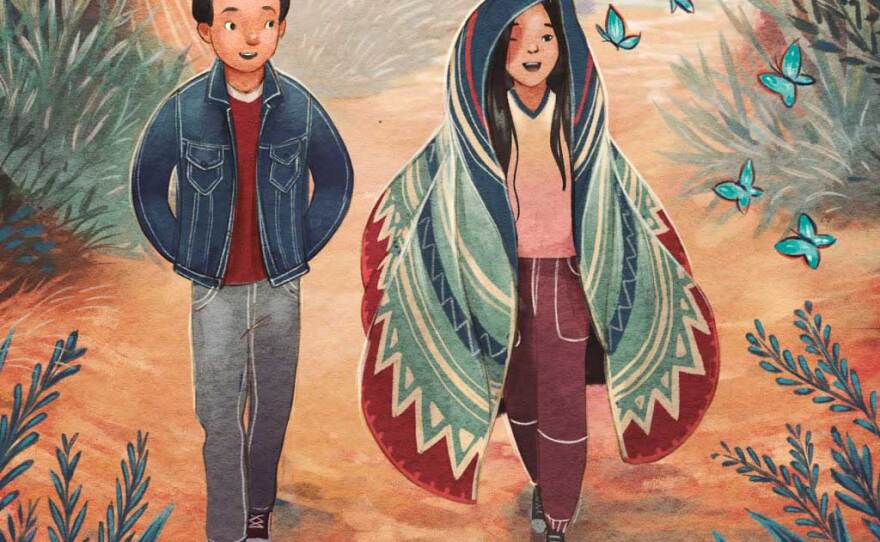"I feel like sometimes verse is my native language," said Chris Baron, author of the new middle-grade novel-in-verse, "The Magical Imperfect." A novel-in-verse is a type of narrative written using poetry, rather than prose, but otherwise acts like a novel.
"All the elements of storytelling — plot, characters, setting, conflict — are all there, but I think verse brings another dimension to it. And there's kind of an intimacy with the reader that happens in a verse novel," Baron said.
This is Baron's second novel, following on the heels of "All Of Me," which also is written in the poetry narrative format.
RELATED: Novel For Middle Schoolers Tackles Body Image, Self Acceptance
"I also think verse can explore the internal landscape of a character a bit more, especially for middle-grade readers. They have so much going on inside," Baron said. "Verse allows for that more internal landscape, that intimacy with their thoughts and emotions to come out."
"The Magical Imperfect" follows the story of 11-year-old Etan, the grandson of a Jewish immigrant who came to the Bay Area through Angel Island. Etan's mother has been hospitalized, and since then, he's developed a form of selective mutism.
"When she left,
I felt like part of my voice
went with her.
[...]
When she reached down
to say goodbye one last time,
she said, I love you, Etan,
just like when she used to tuck me in
after she finished a story.
But when I opened my mouth to say it back,
no words
came out."
Etan befriends Malia, a homeschooled girl who lives on the edge of town. Malia has severe eczema, covering her body in a red, itchy rash and swelling. Kids in the neighborhood refer to her as "the creature."
"I personally love stories of the outcasts who kind of find each other and realize that they're not really outcasts, that they're completely valuable and important as anyone else," Baron said.

Malia and Etan's friendship is rich and connective — not just for the two of them, but also for the community. Their relationship is also no-fuss, celebrating the ways that wanting the best for another person can be uncomplicated and empowering.
The lives of Etan, Malia and their families and friends are beautifully intertwined with rich historical facts, detail and action — using both sports and geological history. The story unfolds against a backdrop of 1989 San Francisco, including the 6.9-magnitude earthquake that happened during Game 3 of the World Series.
Baron said that earthquakes can have a profound impact on young people, who are often dealing with fault lines of their own.
"Something so solid as the earth suddenly isn't anymore. And it's such a powerful sort of metaphor for kids growing up as the world shakes and changes," Baron said.
After the first two games of the World Series, Etan's father is explaining what it might mean for the Giants to come back from two losses, musing that they'll now see "what the Giants are made of."
"And then he leans in.
Being brave
even if it seems
like you don't have any chance
of winning."
Etan understands how this resiliency applies to his family and his friends, too, and how Malia is "made of the strongest stuff."
Baron said that the story of Etan and Malia's immigrant grandparents is another source of strength and understanding for Etan. Both Etan's grandfather and Malia's Lola came to Angel Island on the same ship.

The small, fictional San Francisco town the characters call home is built by immigrants, and as that generation got older and life got in the way for the younger generations, time spent together had dwindled.
The book is laced with ritual, ancestral tradition and magic. There's a magic clay Etan and Malia hope will heal each other. There are memories of Shabbat gatherings and relics and touchstones saved from Etan's grandfather's home.
"I think that so much of the story is intergenerational, it brings the idea of the old world and the new world clashing together and what happens when, you know, older rituals are brought into a newer life," Baron said. "I wanted the book and the story to explore the beauty of these rituals and the challenges that come with them and the way that they, like I said, the old world clashing with the new world and the new way of things, but also how they hold everything together."
When their community is shaken (literally), Etan and Malia have to step up to pick up the pieces — with the ink barely dry on their own individual empowerment.
From the relatable school earthquake drill in the opening scene to the tiny revolution brewing beneath the surface in two young people, "The Magical Imperfect" is about community, resilience, history, and reimagining what it means to be healed.
On Saturday, July 31, Baron will be honored by the San Diego Writers Festival with the 2021 San Diego Festival Award, in the keynote ceremony beginning at 9:30 a.m.







